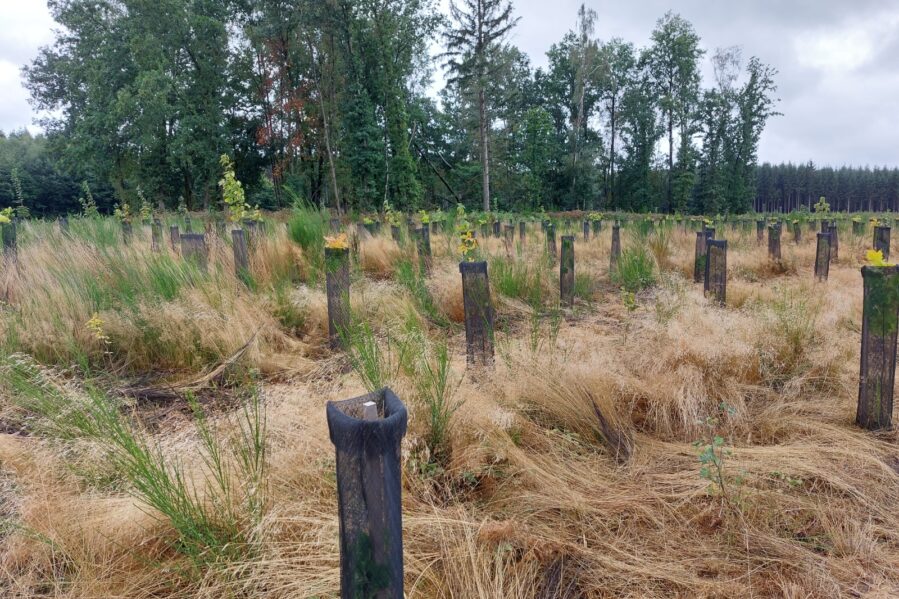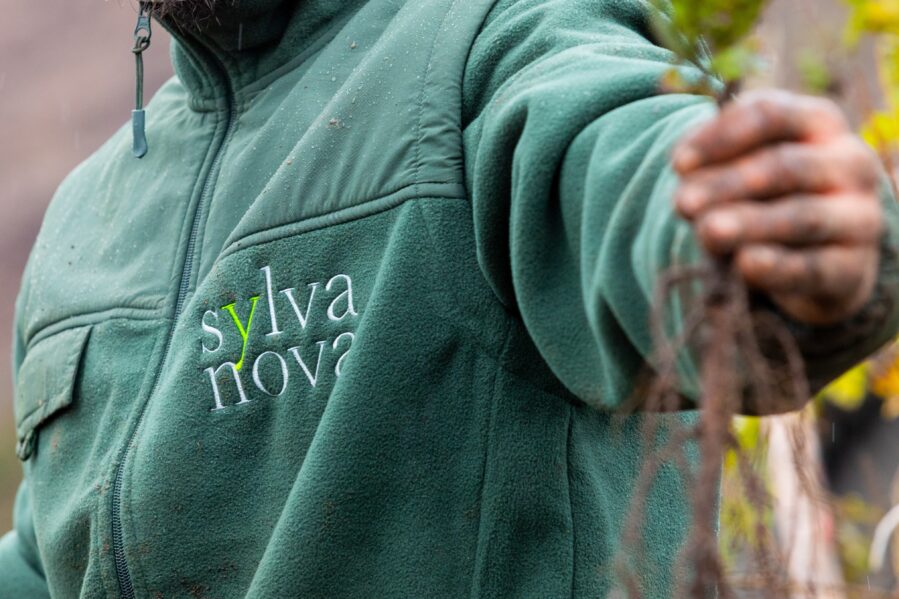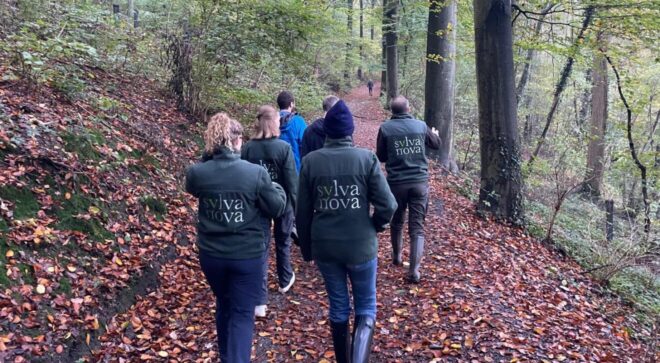Notre mission
Suivre la nature, compléter et hâter son œuvre grâce à notre expertise de terrain, telle est notre ambition pour pérenniser, restaurer ou construire les forêts européennes de demain.
Actualités
Nos projets en action
5 déc
Sylva Nova , ou la forêt de demain.
NTF nous rend visite à l'occasion de notre labellisation Wildlife Estates Label et publie un article dans sa lettre d'information de décembre 2025... Un portrait fidèle de notre savoir-faire et de notre approche que nous partageons avec plaisir. Pour le découvrir : article dans notre page documents.
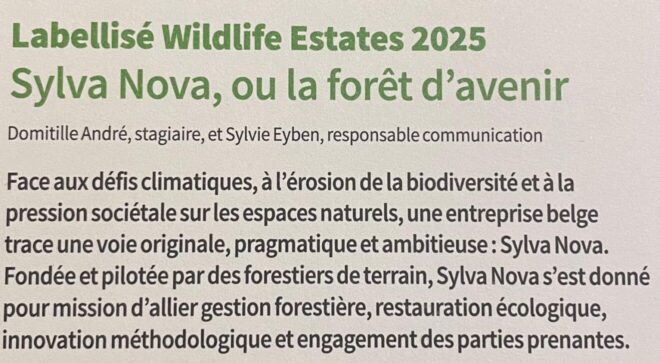
25 juin
Même mort, le bois travaille encore.
Le 6 juin dernier, les équipes de Sylva Nova étaient en visite dans les 6400 hectares de la forêt de Chantilly. Guidés par son gestionnaire, ils ont échangé sur de nombreux enjeux et pratiques forestières, notamment le bois mort volontairement préservé. Le bois mort est une composante clé des écosystèmes forestiers. Sous ses différentes formes (troncs sur pied ou au sol, restes d’exploitation, tas de branches, souches…), il participe au fonctionnement et à la résilience de toute la forêt, principalement :
• Il est le support d’une incroyable biodiversité ; ¼ des espèces forestières en dépend pendant une partie de leur cycle de vie.
• Il intervient dans le cycle du carbone. Le bois mort, au stade de décomposition avancé permet une meilleure inclusion du carbone dans le sol et une formation plus stable de matière organique.
• Aidé par les décomposeurs, il contribue au flux des nutriments rendus assimilables pour la croissance d’une nouvelle génération de plantes. Il fertilise et améliore la qualité des sols forestiers et soutient la régénération naturelle.
• Il stocke de grandes quantités d’eau par une réaction chimique de respiration qui libère des molécules d’eau. Et qui dit humidité, dit aussi moins de risque d’incendies…
• Il représente une barrière naturelle pour la faune sauvage et protège ainsi les jeunes semis de leurs dents.
… Vous l’aurez compris, le bois mort laissé volontairement en forêt est bien plus qu’un simple déchet. Son travail mérite d’être mieux connu et reconnu. A Chantilly, mais aussi dans de nombreuses forêts soutenues par les activités de Sylva Nova, le bois mort est intégré à la gestion forestière courante. Ne pensez pas ou plus que ce soit de la négligence, c’est bien souvent volontaire.
PS : L’équipe de Sylva Nova a profité de sa visite à Chantilly, capitale du cheval, pour aussi monter en selle et partager une expérience doublement bénéfique, pour la cohésion de son équipe et la communion avec le cheval.
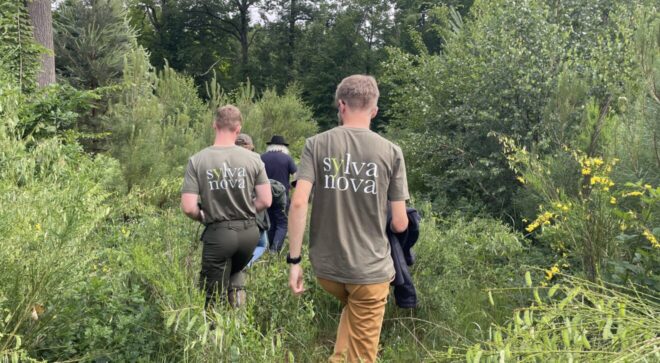
9 mai
Au-delà des plantations, Sylva Nova défend des approches multiples et des techniques innovantes de préservation et de restauration.
La préservation et la restauration du couvert forestier existant représente aux yeux de Sylva Nova un enjeu tout aussi crucial que celui des plantations additionnelles. Toutefois, ces projets aux bénéfices multiples et immédiats sont malheureusement moins connus et en conséquence moins soutenus.
Chez Sylva Nova, nous accordons une attention particulière à la valorisation de la régénération naturelle dans tous les projets que nous menons et n’hésitons pas à tester de nouvelles pratiques sylvicoles pour contribuer à la résilience de nos forêts. 3 exemples valorisant l’innovation forestière au profit de la préservation de l’existant sont décrits dans notre page Documents : une nouvelle essence de chêne testée à Argenteau (Belgique), de la dissémination de graines et glands par des oiseaux à Esperia (Italie) et une plantation de glands germés dans une Dehesa à Hornechuelos (Espagne).
Sylva Nova contribue à de tels projets en combinant son expertise à celles de partenaires locaux, de propriétaires, d’universités ou centres de recherche. Chaque territoire fait face à des enjeux spécifiques auxquels nous sommes heureux de contribuer en partageant aussi les pratiques innovantes mises en œuvre ailleurs. N’hésitez pas à nous contacter pour soutenir de tels projets !
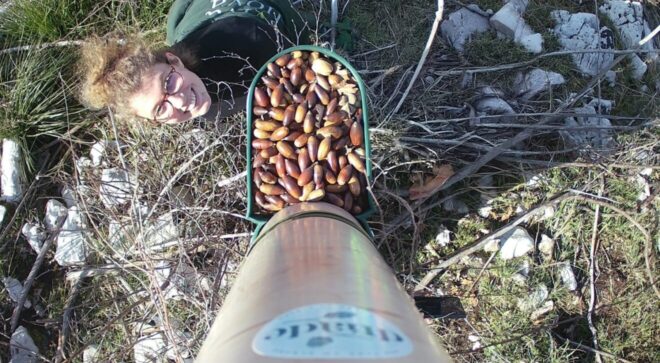
20 mars
21 Mars, Journée internationale des forêts: Sylva Nova confronte les enjeux forestiers aux attentes citoyennes dans un tout nouveau Living Lab Forestier à Argenteau (Belgique)
La journée internationale des forêts est célébrée chaque année le 21 mars. Chaque année, une nouvelle thématique est proposée pour célébrer la forêt dans sa diversité. Diversité de composition et de fonctionnement bien évidemment, mais surtout diversité d’usages et de bénéfices : écologiques, économiques, sociétaux. Ces 3 grandes fonctions sont à la fois complémentaires et interdépendantes, aucune d’entre-elles ne devant être exclue pour ne pas rompre l’équilibre. Les pratiques de gestion forestière mises en place en Europe par Sylva Nova sont fondamentalement guidées par cette multifonctionnalité. Mais qui dit « multi » peut aussi dire « conflit » … Aussi, face à la diversité des attentes des usagers de la forêt, Sylva Nova démarre cette année une nouvelle expérience : un living lab forestier de co-construction citoyenne autour de sa forêt d’Argenteau (Belgique), une forêt ouverte au grand public. Avec l’expertise et le support méthodologique de AgroParis-Tech, les parties prenantes de cette forêt vont se réunir pour ensemble confronter les enjeux forestiers aux attentes de ses usagers. Les conclusions de cette démarche d’intelligence collective permettront à Sylva Nova d’adapter son plan de gestion forestière pour garder cette forêt ouverte au grand public tout en ayant tenu compte de ses attentes et probablement gagner sa confiance… C’est en se connaissant mieux, en connaissant mieux la forêt et ses enjeux, que chacun devrait contribuer à sa pérennisation et bénéficier de sa multifonctionnalité !
11 mars
D’Ieteren investit dans Sylva Nova pour renforcer à nos côtés la résilience des forêts en Europe et compléter sa stratégie de durabilité.
Cette collaboration avec D’Ieteren n’est pas récente, nous l’expérimentons positivement depuis 3 ans. Ce qui change aujourd’hui, ce sont des moyens, des expertises supplémentaires et complémentaires pour remplir encore mieux notre mission. Face à l’ampleur croissante des enjeux climatiques, cet investissement nous permettra d’accélérer nos actions et d’amplifier l’impact de nos projets au profit de la résilience des forêts et de tous les bénéfices qu’elles procurent. Comment ? En nous soutenant dans des projets de recherche et d’études en gestion durable des forêts, en développant un mécanisme de mesure fiable et quantifiable de la capture naturelle du carbone et en fédérant un maximum d’acteurs autour de cette cause cruciale. Nous nous réjouissons de cette évolution soutenue par une entreprise belge bicentenaire avec qui nous partageons une vision à long terme!

25 sept
Rentrée renforcée chez Sylva Nova
La saison 2024-2025 démarre à plein régime chez Sylva Nova : 30 années d'expérience à fêter, deux nouveaux collaborateurs experts forestiers directement adoptés, un nouveau site web pour mieux décrire qui nous sommes et ce que nous faisons, en couleurs printanières ou automnales, de nouveaux bureaux pour mieux interagir, les premières certifications FSC® Services Ecosystémiques à obtenir, des projets de recherche européens en attente... Nous sommes prêts à aller de l'avant!

8 octo
Traction par chevaux à Argenteau
Restauration millimétrée de parcelles résineuses délaissées, dans notre forêt-pilote d'Argenteau, démontrant que l'utilisation du cheval ne relève nullement de la nostalgie ou du folklore mais constitue, en association avec des moyens techniques judicieusement calibrés, une solution d'avenir face à certains enjeux. Merci à notre partenaire D'Ieteren de nous aider à concrétiser de tels projets.
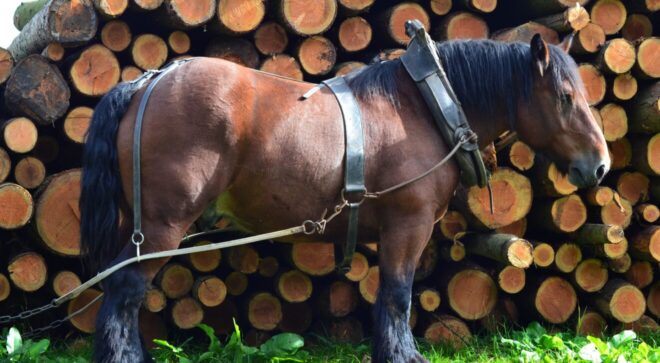

Climate action
Prendre d’urgence des mesures pour lutter contre les changements climatiques et leurs répercussions.



